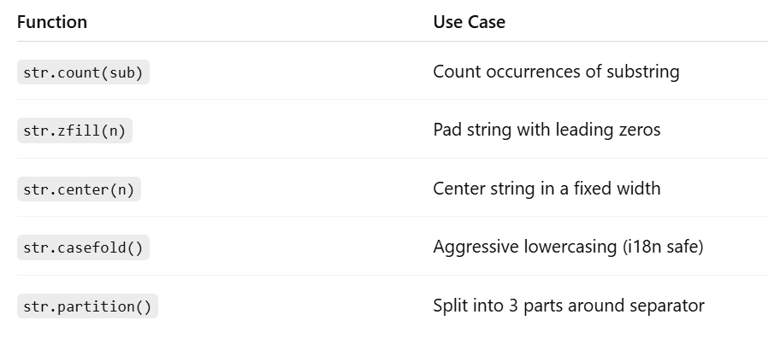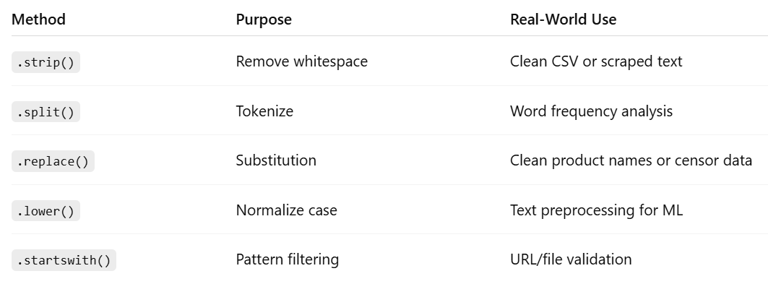🔤 Mastering Strings and String Functions in Python: Real-World Examples
PYTHON
5/5/20252 min read


In Python, strings are everywhere — from column names and filenames to user inputs, logs, and scraped text. Mastering how to handle, clean, and manipulate strings is essential for efficient and clean code, especially in data science and automation.
In this blog, we’ll break down the most useful string methods with real-world use cases to help you get more productive with text in Python.
🧠 What Is a String in Python?
A string is a sequence of Unicode characters enclosed in quotes:
name = "Alice"
msg = 'Welcome!'
Python strings are:
Immutable (can’t be changed in-place)
Iterable (can loop over characters)
Packed with built-in methods for manipulation
🔧 Common String Methods with Real-Life Examples
✅ 1. .lower(), .upper(), .title()
Use case: Standardizing user input or text data.
name = "aLiCE"
print(name.lower()) # 'alice'
print(name.upper()) # 'ALICE'
print(name.title()) # 'Alice'
🔍 2. .find(), .index()
Use case: Locating specific keywords in logs or user input.
email = "contact@example.com"
print(email.find('@')) # 7
✅ Real-world: Check if email is valid:
if '@' in email and '.' in email:
print("Likely a valid email.")
✂️ 3. .strip(), .lstrip(), .rstrip()
Use case: Cleaning extra spaces or newline characters in text files or CSVs.
line = " Hello, world! \n"
print(line.strip()) # 'Hello, world!'
🔁 4. .replace()
Use case: Censoring sensitive data or fixing typos.
msg = "The password is 1234"
print(msg.replace("1234", "****"))
✨ 5. .startswith(), .endswith()
Use case: File and URL filtering.
filename = "report_2023.csv"
if filename.endswith('.csv'):
print("Processing CSV file...")
✅ Real-world: Only process image URLs:
if url.startswith("http") and url.endswith(".jpg"):
download(url)
🔗 6. .split(), .join()
Use case: Tokenizing strings or combining lists.
sentence = "Data science is fun"
words = sentence.split() # ['Data', 'science', 'is', 'fun']
✅ Real-world: Reconstructing text:
words = ['data', 'cleaning', 'done']
print(" | ".join(words)) # 'data | cleaning | done'
🔁 7. .replace() + .lower() for Text Normalization
Use case: Normalize messy case-insensitive text from users.
feedback = " Very GOOD service! "
normalized = feedback.strip().lower().replace("very ", "")
print(normalized) # 'good service!'
🕵️♂️ 8. .isalpha(), .isdigit(), .isalnum()
Use case: Data validation and cleaning.
"abc123".isalnum() # True
"123".isdigit() # True
"hello".isalpha() # True
🧠 f-Strings (String Interpolation)
Use case: Cleaner logging and reporting.
user = "Alice"
score = 93
print(f"{user} scored {score} points") # Alice scored 93 points
🛠 Other Handy String Functions at a Glance


🚀 Summary


Strings are core to almost every application — from cleaning data to building APIs. Mastering these simple string functions unlocks serious productivity and cleaner code.


Kishore Babu Valluri
Senior Data Scientist | Freelance Consultant | AI/ML & GenAI Expert
With deep expertise in machine learning, artificial intelligence, and Generative AI, I work as a Senior Data Scientist, freelance consultant, and AI agent developer. I help businesses unlock value through intelligent automation, predictive modeling, and cutting-edge AI solutions.
Let's Get in Touch
marketing@deepaiautomation.com
+91 6309397994
© 2025. All rights reserved.
Industries
Manufacturing
Financial Services
Retail
Solutions
DocuMind AI - Intelligent Document Migration
InsightEdge AI - Intelligent Power BI Reporting & Analytics
DCT AI - Digital Control Tower for Intelligent Enterprise Visibility
Inventra AI - Intelligent Inventory Optimization Platform
Maintenix AI - Predictive Maintenance Intelligence Platform
PayPredict AI - Intelligent Customer Payment Prediction Platform
SegMind AI - Intelligent Customer Segmentation & RFM Analytics Platform
DataForge AI - Intelligent ETL & Analytics Modernization Platform
DataSense AI - Intelligent Data Quality & Outlier Detection Agent
